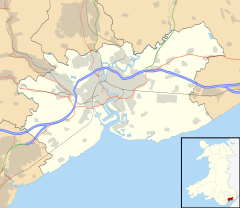| Tredegar House | |
|---|---|
 "The most splendid brick house of the 17th century in Wales."[1] | |
| General information | |
| Type | Country house and gardens (32 hectares) |
| Architectural style | Carolean |
| Town or city | Newport, Monmouthshire |
| Country | Wales |
| Coordinates | 51°33′41.66″N 3°1′45″W / 51.5615722°N 3.02917°W |
| Construction started | 1664 |
| Completed | 1672 |
| Client | William Morgan (of Machen and Tredegar) |
| Management | National Trust |
| Website | |
| National Trust: Tredegar House | |
Listed Building – Grade I | |
| Official name | Tredegar House[2] |
| Designated | 3 March 1952[2] |
| Reference no. | 2902[2] |
| Official name | Tredegar Park[3] |
| Designated | 1 February 2022[3] |
| Reference no. | PGW(Gt)48(NPT)[3] |
| Listing | Grade II*[3] |
Tredegar House (Welsh: Tŷ Tredegar) is a 17th-century Charles II-era mansion in Coedkernew, on the southwestern edge of Newport, Wales. For over five hundred years it was home to the Morgan family, later Lords Tredegar, one of the most powerful and influential families in the area. Described as "the grandest and most exuberant country house in Monmouthshire"[4] and one of the "outstanding houses of the Restoration period in the whole of Britain",[4] the mansion stands in a reduced landscaped garden of 90 acres (0.36 km2). The property became a Grade I listed building on 3 March 1952[5] and has been under the care of the National Trust since March 2012. The park surrounding the house is designated Grade II* on the Cadw/ICOMOS Register of Parks and Gardens of Special Historic Interest in Wales.[6]
- ^ Smith 1975, p. 277.
- ^ a b c Cadw. "Tredegar House (Grade I) (2902)". National Historic Assets of Wales. Retrieved 10 April 2024.
- ^ a b c d Cadw. "Tredegar Park (Grade II*) (301)". National Historic Assets of Wales. Retrieved 10 April 2024.
- ^ a b Newman, p. 562
- ^ Cadw. "Tredegar House, Newport (Grade I) (2902)". National Historic Assets of Wales. Retrieved 16 February 2024.
- ^ Cadw. "Tredegar Park (PGW(Gt)48(NPT))". National Historic Assets of Wales. Retrieved 6 February 2023.
